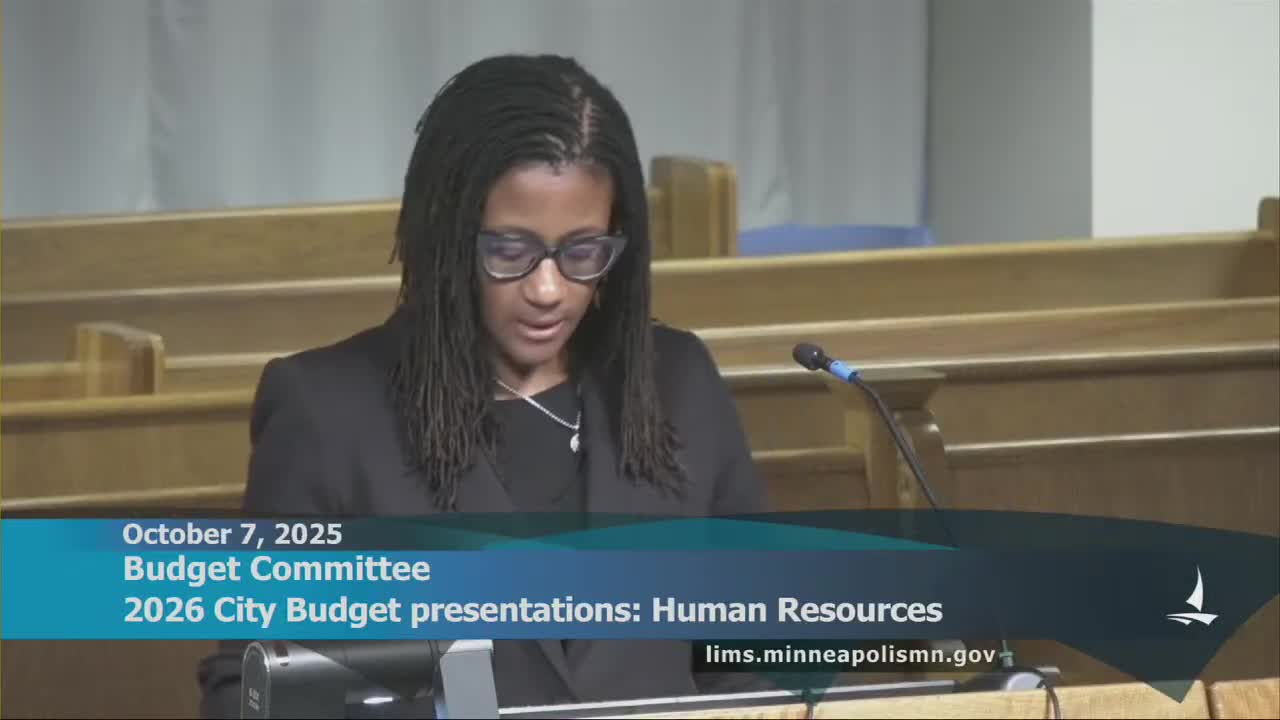City HR presents 2026 budget focused on paid-family leave implementation, ERP transition and maintaining benefits without new funding
Get AI-powered insights, summaries, and transcripts
Subscribe
Summary
Chief Human Resources Officer Nikki Odom told the Budget Committee the HR department will implement Minnesota paid family and medical leave in 2026, support an enterprise ERP (Workday) transition, reduce two FTEs under the mayor's recommendation, and is relying on internal savings and self-insurance reserves rather than new general-fund dollars.
Nikki Odom, chief human resources officer for the City of Minneapolis, presented the Human Resources Department's recommended 2026 budget to the Budget Committee on Oct. 7, saying the department is managing several enterprise initiatives without requesting new funding.
"We're not asking for new funding in 2026. We're asking for continued support and confidence in our strategy," Odom said, summarizing an approach that relies on cost management, self-insured medical-plan savings and targeted structural changes.
Odom said HR is a team of about 65 professionals supporting more than 4,000 employees across 27 departments. She described three strategic pillars for the department — "welcome all" (diverse pipelines), "grow leaders" (talent development) and "inspire belonging" (culture and equity) — and emphasized work to implement Minnesota's paid family and medical leave law, which takes effect Jan. 1, 2026. She also highlighted the upcoming enterprise transition to a Workday ERP system and said HR is leading change management, staff training and policy work to support that implementation.
On benefits, Odom said the city's self-insured medical plan has produced large savings compared with fully insured models and that credits and incentives from the medical provider have offset expansions in wellness programs such as free counseling and chronic-condition management.
On staffing and budget changes, Odom said the 2026 recommended budget includes a reduction of two FTEs and several targeted savings measures. She described moving two full-time positions from the general fund to the city's medical self-insurance fund to align administrative costs with the fund they support and said HR currently has four vacancies.
Committee members asked for follow-up details. Council Member Rainville asked how many collective bargaining agreements the city would negotiate next year; Odom did not have the number immediately and said she would provide it later, noting there were about 10 remaining to negotiate for 2025. Council Member Cashman asked about vacancies in talent acquisition; Odom said one position is being held for reduction under the mayor's recommended budget.
Labor relations director Rashida Deloney, who joined the presentation, said labor relations typically receives about 20 grievances annually and that the division is on track to meet a department target of resolving grievances at the lowest level. "Typically labor relations receives around the ballpark about 20 grievances annually, give or take," Deloney said.
Odom also provided performance highlights: a large increase in urban scholars applications, continued police recruitment success with more than 110 new officers hired this year and sworn strength above 600 for the first time since 2022, and a steady time-to-fill metric under three months. She told the committee HR will continue to partner with REIB (Racial Equity, Inclusion and Belonging) and other departments to embed equity across HR processes.
The committee asked the clerk to file the HR presentation for the record.
